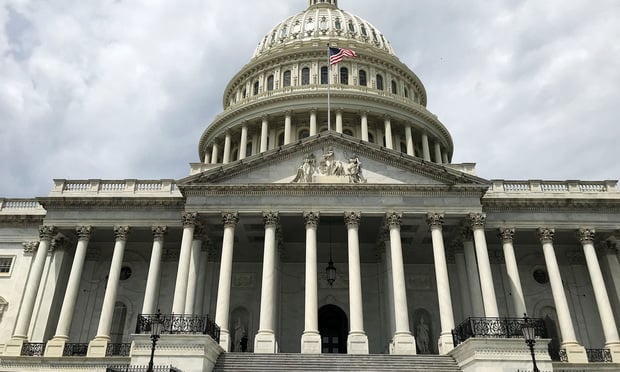How to Navigate the Changing Tide of Federal Regulation
Young lawyers are uniquely suited to remain abreast of new developments and can provide value to clients by becoming subject matter experts.
October 16, 2019 at 12:28 PM
6 minute read
 U.S. Capitol building in Washington, D.C. June 13, 2018.
U.S. Capitol building in Washington, D.C. June 13, 2018.
From the Editor: We're back with the latest column in our "On the Rise: Voices from Young Lawyers" series, featuring insight by our 2019 D.C. Rising Stars on key practice topics. Brian Walsh, a partner with Wiley Rein, writes that young lawyers can add value by staying abreast of regulatory changes and flagging issues early. In so doing, they can fully own their roles as gatekeepers and subject matter experts for clients and more senior attorneys. For more, read on. —Lisa Helem, editor-in-chief, The National Law Journal
Any company doing business within the United States, or with the federal government, is constantly operating under a litany of regulations governing everything from how much paid sick leave it must provide its employees to what it must do before acquiring another company. Young lawyers who are proactive, rather than reactive on regulatory changes, can be of great value to their clients.
Anticipating needs and staying abreast of regulatory changes also enables young lawyers to add value and be better advocates and advisers than those who just sit back and wait for their clients to call with a question on a new proposed rule. To stay ahead of the curve, companies and the lawyers advising them, should keep three things in mind.
Be Proactive. Federal Regulations Don't Just Change Overnight.
Quite often it seems that companies are willing to spend a lot of money challenging a rule or regulation in court after it has been implemented but very unwilling to spend money before enactment of a new rule or regulation. New rules don't magically appear in the Federal Register. It often can take years of public commenting and negotiating for a rule to become final.
 Rulemaking inertia may lead companies to lose sight of a potential new rule that could negatively affect them. But it is during this time period that a company might have the best chance of avoiding ever having to challenge, or comply with, a new and potentially onerous regulation.
Rulemaking inertia may lead companies to lose sight of a potential new rule that could negatively affect them. But it is during this time period that a company might have the best chance of avoiding ever having to challenge, or comply with, a new and potentially onerous regulation.
Companies have various means at their disposal to try to avoid the implementation of disruptive new regulations—from submitting comments on the proposed rule to lobbying Congress to change the law the rule is intended to implement. Here, an ounce of prevention is certainly worth a pound of cure, and potentially millions of dollars in legal fees and costs related to complying with a new regulation or challenging it in litigation.
Young lawyers are particularly well situated to play an important role in this process as gatekeepers to flag these issues sooner rather than later as more senior attorneys will not likely spend their time monitoring the Federal Register.
Don't Assume an Administration Change Will Result in Regulatory Change.
Because it is often very hard for any administration to pass laws enacting major social change, both parties are often willing to settle on using federal government contractors as "guinea pigs" for social programs. This was the case, for example, during the Obama administration when two executive orders were issued—Nondisplacement of Qualified Workers under Service Contracts (EO 13495) and Establishing Paid Sick Leave for Federal Contractors (EO 13706)—expanding the rights of employees working on federal contracts.
The Nondisplacement Rule requires "a successor contractor and its subcontractors to offer employees working under the predecessor contract whose employment will be otherwise terminated, a right of first refusal of employment under the successor contract in positions for which they are qualified." The Paid Sick Leave Rule requires parties that enter into covered contracts with the federal government to provide covered employees with up to seven days of paid sick leave annually, including paid leave allowing for family care.
It is fair to say that these two rules, regardless of your political affiliation, objectively place a large burden on government contractors because the compliance obligations involved are often inconsistent with how modern companies hire and compensate employees. And it is also fair to say that many companies assumed they would never have to comply with the Paid Sick Leave Rule or would be able to stop complying with the Nondisplacement Rule, following the election of President Donald Trump and, based on that assumption, throttled down their compliance efforts.
But the Trump administration did not repeal either of these executive orders, placing companies that assumed they would be rolled back in a very difficult position that, in many cases, dramatically increased the costs of becoming compliant with the Paid Sick Leave Rule in a shorter period of time.
Young lawyers advising clients need to be wary of the pitfalls of making these types of assumptions so when they advise their clients they don't inadvertently lead them down a path to complacency.
Stay Informed.
Statutes and their implementing regulations frequently change, and companies need to ensure that they stay abreast of recent developments affecting their industry. A good example of this is the expansion of the Committee on Foreign Investment in the United States' jurisdiction and authority due to legislation enacted in 2018.
In response, CFIUS recently launched a pilot program covering foreign investments in U.S. critical technology companies. Whereas the CFIUS review process was previously voluntary and limited to transactions that could result in foreign control of a U.S. business, the new pilot program requires mandatory filings for certain controlling and even noncontrolling critical technology investments at least 45 days before closing of the transaction.
Foreign-owned or -controlled companies operating in the U.S. now must analyze whether any transaction they are contemplating is a "pilot program covered transaction" before moving forward with that transaction, something a company can't do if it is unaware of the change in CFIUS oversight.
Although the number of new federal regulations in process has generally remained stable in the first two years of the Trump administration (as compared with the number of active rulemakings at the end of the Obama administration), a significant number of the current rulemakings involve deregulation, a trend that is likely to continue under the Trump administration.
While in the short term this may be a welcomed event for many companies, it is important for companies to remain informed so they can adapt to shifts in the current administration's agenda or a change in which party controls the White House in 2020.
Here too, young lawyers are uniquely suited to remain abreast of new developments and, when change does occur, can use this to their advantage to become a go-to subject-matter expert providing invaluable advice to both their clients and more senior lawyers within their organization.
Brian Walsh is a partner in Wiley Rein's government contracts practice, where he represents government contractors and subcontractors, as well as federal and state grant recipients, on a variety of matters.
This content has been archived. It is available through our partners, LexisNexis® and Bloomberg Law.
To view this content, please continue to their sites.
Not a Lexis Subscriber?
Subscribe Now
Not a Bloomberg Law Subscriber?
Subscribe Now
NOT FOR REPRINT
© 2025 ALM Global, LLC, All Rights Reserved. Request academic re-use from www.copyright.com. All other uses, submit a request to [email protected]. For more information visit Asset & Logo Licensing.
You Might Like
View All
11th Circuit Rejects Trump's Emergency Request as DOJ Prepares to Release Special Counsel's Final Report
3 minute read
4th Circuit Revives Racial Harassment Lawsuit Against North Carolina School District
3 minute read
Fenwick and Baker & Hostetler Add DC Partners, as Venable and Brownstein Hire Policy Advisers
2 minute read
DOJ, 10 State AGs File Amended Antitrust Complaint Against RealPage and Big Landlords
4 minute readTrending Stories
- 1'It's Not Going to Be Pretty': PayPal, Capital One Face Novel Class Actions Over 'Poaching' Commissions Owed Influencers
- 211th Circuit Rejects Trump's Emergency Request as DOJ Prepares to Release Special Counsel's Final Report
- 3Supreme Court Takes Up Challenge to ACA Task Force
- 4'Tragedy of Unspeakable Proportions:' Could Edison, DWP, Face Lawsuits Over LA Wildfires?
- 5Meta Pulls Plug on DEI Programs
Who Got The Work
Michael G. Bongiorno, Andrew Scott Dulberg and Elizabeth E. Driscoll from Wilmer Cutler Pickering Hale and Dorr have stepped in to represent Symbotic Inc., an A.I.-enabled technology platform that focuses on increasing supply chain efficiency, and other defendants in a pending shareholder derivative lawsuit. The case, filed Oct. 2 in Massachusetts District Court by the Brown Law Firm on behalf of Stephen Austen, accuses certain officers and directors of misleading investors in regard to Symbotic's potential for margin growth by failing to disclose that the company was not equipped to timely deploy its systems or manage expenses through project delays. The case, assigned to U.S. District Judge Nathaniel M. Gorton, is 1:24-cv-12522, Austen v. Cohen et al.
Who Got The Work
Edmund Polubinski and Marie Killmond of Davis Polk & Wardwell have entered appearances for data platform software development company MongoDB and other defendants in a pending shareholder derivative lawsuit. The action, filed Oct. 7 in New York Southern District Court by the Brown Law Firm, accuses the company's directors and/or officers of falsely expressing confidence in the company’s restructuring of its sales incentive plan and downplaying the severity of decreases in its upfront commitments. The case is 1:24-cv-07594, Roy v. Ittycheria et al.
Who Got The Work
Amy O. Bruchs and Kurt F. Ellison of Michael Best & Friedrich have entered appearances for Epic Systems Corp. in a pending employment discrimination lawsuit. The suit was filed Sept. 7 in Wisconsin Western District Court by Levine Eisberner LLC and Siri & Glimstad on behalf of a project manager who claims that he was wrongfully terminated after applying for a religious exemption to the defendant's COVID-19 vaccine mandate. The case, assigned to U.S. Magistrate Judge Anita Marie Boor, is 3:24-cv-00630, Secker, Nathan v. Epic Systems Corporation.
Who Got The Work
David X. Sullivan, Thomas J. Finn and Gregory A. Hall from McCarter & English have entered appearances for Sunrun Installation Services in a pending civil rights lawsuit. The complaint was filed Sept. 4 in Connecticut District Court by attorney Robert M. Berke on behalf of former employee George Edward Steins, who was arrested and charged with employing an unregistered home improvement salesperson. The complaint alleges that had Sunrun informed the Connecticut Department of Consumer Protection that the plaintiff's employment had ended in 2017 and that he no longer held Sunrun's home improvement contractor license, he would not have been hit with charges, which were dismissed in May 2024. The case, assigned to U.S. District Judge Jeffrey A. Meyer, is 3:24-cv-01423, Steins v. Sunrun, Inc. et al.
Who Got The Work
Greenberg Traurig shareholder Joshua L. Raskin has entered an appearance for boohoo.com UK Ltd. in a pending patent infringement lawsuit. The suit, filed Sept. 3 in Texas Eastern District Court by Rozier Hardt McDonough on behalf of Alto Dynamics, asserts five patents related to an online shopping platform. The case, assigned to U.S. District Judge Rodney Gilstrap, is 2:24-cv-00719, Alto Dynamics, LLC v. boohoo.com UK Limited.
Featured Firms
Law Offices of Gary Martin Hays & Associates, P.C.
(470) 294-1674
Law Offices of Mark E. Salomone
(857) 444-6468
Smith & Hassler
(713) 739-1250










